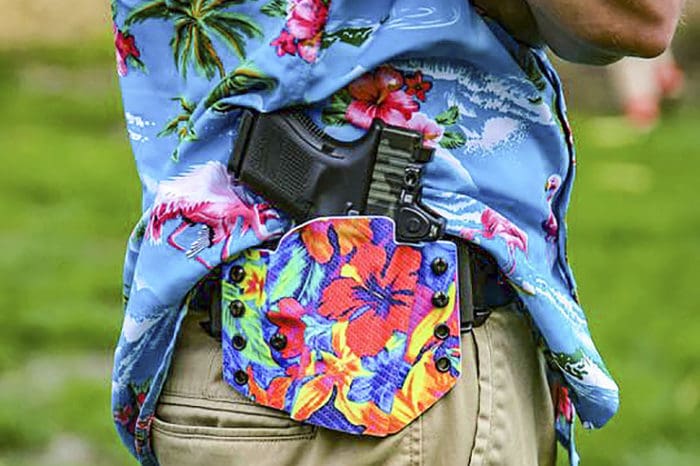Gun control activists talk a lot about “safety.” They love the word so much, they’ve tried to entirely re-brand gun control as “gun safety.” But in reality, “gun safety” is just their latest buzzword for leaving you disarmed and helpless.
Worse, “common-sense gun safety” has become a near constant refrain from those who oppose your natural right to self-defense. But their idea of “common sense” is to claim you’re safer when it’s more difficult to defend yourself from violent criminals.
Some courts have even given in to this bizarre view of “safety.” While the Supreme Court has stood strong on firearm rights (although it has remained silent on the issue for too long), lower courts have not, often giving way when states claim their restrictions protect “public safety.”
Hawaii is one of the worst offenders against the People’s right to self-defense, with judicial approval from the federal courts that cover Hawaii, including the infamous Ninth Circuit Court of Appeals. And Hawaii is now lazily invoking the gun control narrative of “gun safety” to further its infringement.
But Hawaii can’t just invoke “safety” and do whatever it wants. In 2021, two of the state’s more absurd gun restrictions—pure bureaucratic barriers with no justification—were ruled unconstitutional by the federal district court in Hawaii in the case of Yukutake v. Connors.
It was a first-round victory for Todd Yukutake, an Army veteran fighting for self-defense rights alongside Honolulu small business owner David Kikukawa. Their ongoing lawsuit is a challenge to laws requiring government-granted permits—permits that make handgun ownership difficult, if not impossible, for ordinary working people.
Now, Hawaii is trying to revive these obstacles to gun ownership, and the matter is being fought out in the Ninth Circuit Court of Appeals.
The laws at issue here are a perfect illustration of this basic anti-gun premise: government control equals safety.
After obtaining the initial “permit to acquire” a handgun, Hawaiians were required by law to make their purchase within ten days, or the permit would expire. If they cleared that hurdle, the new owners were then required to bring the weapon to the police department for in-person inspection and registration, during limited hours of operation, within five days of the purchase.
These are not true safety measures. They are immoral, unconstitutional burdens on the exercise of a natural right. If free speech or the free exercise of religion were treated similarly, subjected to arbitrary government regulation, there would be national outrage.
During initial proceedings in the federal district court, the state of Hawaii thought it could simply invoke the ambiguous rationale of “safety” to clear the low bar of intermediate scrutiny, which requires only a reasonable fit between the challenged law and an important government interest. (While this is not the proper legal test for gun rights cases, it is typical for the Ninth Circuit.)
Hawaii, however, failed to meet even this extremely low standard. The state offered no serious argument as to how its time-limited permitting and in-person registration demands would actually serve the interest of “public safety.”
But the state asserted, without evidence, that these barriers to gun ownership would enhance public safety because “such requirements provide more effective supervision and control over the sale, transfer, and possession of firearms.” During oral argument, the state said its position boiled down to “common sense.”
Here, we have a remarkably pure example of gun control ideology at work. “Supervision and control” are presented as automatically making us safer—even when the government offers no worthy argument to this effect.
Making matters worse, Hawaii insists that this premise—government control equals safety—is a matter of obvious “common sense.”
The district court in Yukutake, however, was not persuaded. It found the government had “entirely failed to demonstrate how each law effectuates its asserted interest in public safety.”
If Hawaii had better arguments, the state would have offered them. Instead, Hawaii showed its clear disrespect for the People’s natural right to self-defense by making the empty argument that residents are safer when it’s harder for them to exercise their right to defend their lives and the lives of their loved ones.
Americans across the political spectrum increasingly see the absurdity of this position. When it rules on Hawaii’s appeal in the Yukutake case, hopefully the Ninth Circuit won’t regard such nonsense as “common sense.”
Cody J. Wisniewski (@TheWizardofLawz) is the director of Mountain States Legal Foundation’s Center to Keep and Bear Arms. He primarily focuses on Second Amendment issues but is happy so long as he is reminding the government of its enumerated powers and constitutional restrictions.
To learn more about the Center to Keep and Bear Arms’ work and support their fight for your natural right to self-defense—from both man and tyranny—visit www.mslegal.org/2A and donate today!
